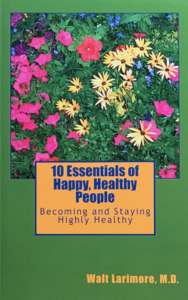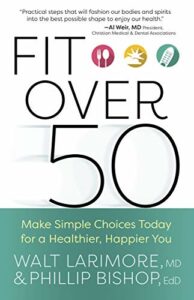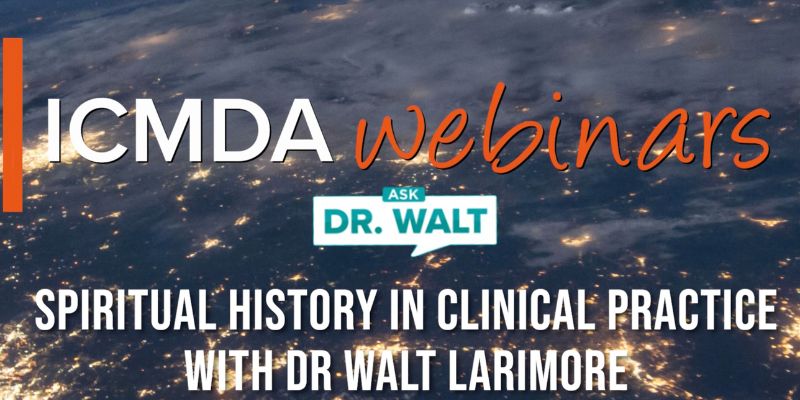Ask Dr. Walt 12 – Essential #6 – Cultivate a Positive Spirituality OR The Essential of Spiritual Health (Part 1)

Letter to a devastated Christian OR “The redemption of a ‘broken bowl'”
July 21, 2023
How to Cherish Your Wife (Part 1)
July 26, 2023Ask Dr. Walt 12 – Essential #6 – Cultivate a Positive Spirituality OR The Essential of Spiritual Health (Part 1)
What do doctors mean when they talk about spiritual health? And did you know that your spiritual health can have a dramatic effect on your physical and emotional health? I’ll tell you all about it on today’s episode of Ask Dr. Walt.
From 2021-2022, I was honored to host a TV show on LiftableTV, “Ask Dr. Walt.” In this series, I’m explaining the 10 key habits or 10 essentials of happy, healthy people.
What do doctors mean when they talk about spiritual health? And did you know that your spiritual health can have a dramatic effect on your physical and emotional health? I’ll tell you all about it on today’s episode of Ask Dr. Walt: Essential #6 – Cultivate a Positive Spirituality OR The Essential of Spiritual Health (Part 1). You can click below to watch a video of the show, or I’ve put the show transcript at the end of the blog if you’d prefer that.
You can learn more about this topic in my best-selling book, 10 Essentials of Happy, Healthy People: Becoming and staying highly healthy or Fit over 50: Make Simple Choices for a Healthier, Happier You.
CLICK HERE FOR 10 E’S CLICK HERE FOR Fo50
Disclaimer: The Ask Dr. Walt show is designed for entertainment purposes to give information on various medical conditions, treatments, and procedures for your personal knowledge and to help you be a more informed consumer of medical and health services.
SHOW TRANSCRIPT
TEASE:
What do doctors mean when they talk about spiritual health? And did you know that your spiritual health can have a dramatic effect on your physical and emotional health? I’ll tell you all about it on today’s episode of Ask Dr. Walt.
OPEN:
Hi, everyone. I’m family physician Dr. Walt Larimore and I’m delighted you are taking the time today to join me in my home office as we continue our discussion about some of the essentials of becoming healthy.
We’ve begun reviewing my top 10 recommendations for you to consider on a path to become healthier physically, emotionally/mentally, relationally, and spirituality.
WE’VE ALREADY COVERED:
- The essential of true health—physical, emotional, relational, and spiritual
- The essential of self-care—how to be proactive in preventing disease
- The essential of reducing SADness—stress, anxiety, and depression (2 parts)
- The essential of forgiveness—how to practice acceptance and letting go (2 parts)
- The essential of relationships—avoid loneliness like the plague (2 parts)
TODAY WE’LL COVER:
- The essential of spiritual health—cultivate a positive spirituality – Part one
IN FUTURE SHOWS WE’LL COVER
- The essential of a positive self-image—how to see yourself as your Creator sees you
- The essential of discovering your destiny—how to nurture your hopes and dreams
- The essential of personal responsibility and empowerment—how to become your own healthcare quarterback
- The essential of teamwork in healthcare—how to team up with winning healthcare professionals
At the end of today’s program, I’ll tell you how to submit in your questions for any of these four remaining topics.
We’ll start with a question from Penny in Colorado Springs: “Dr. Walt, will just any type of spirituality or religiosity work to improve health? Does it make a difference if you attend services but don’t believe?”
That’s a great question with which to begin our show. Let me answer your question by telling you a story. I met Jerry, a family physician, at a medical conference where I had given a presentation on how the latest medical research supported what I saw in my own practice for years, namely, that a person’s spiritual wellbeing had a significant positive impact on their physical, emotional, and relational health. Jerry told me, “I don’t see that in my practice. The church-going folks I care for don’t seem very healthy at all.”
I asked him, “Do you have any way to assess their spiritual health?” He shook his head and said, “Should I?” I immediately thought about Fran, a patient who had been a decade-long inspiration to me before she died at the age of ninety-two. I told Jerry that Fran attended church regularly, but her spiritual health went far beyond church attendance. She volunteered to help others in her community whenever she could. Her spiritual life was in and outside of the church walls and she’d been doing both for more than seventy-five years! She was a woman of deep personal faith whose religious beliefs actually changed her behavior and attitude seven days a week. She rarely visited my office more than once or twice a year, but when she did she always made some reference to her love for God and commitment to her spiritual journey.
During our last visit she said, “I know I’m not going to live forever, but who would want to? I feel pretty good right now, but I’ll be jumping for joy when I meet my Creator face-to-face!” Her face literally glowed, and she explained: “For twice as long as you’ve been alive, I’ve been enjoying His companionship and thanking Him for his faithfulness in helping me be who He created me to be. I talk to God all the time, and I’m here to tell you—He listens! It’s been a good life, walking hand in hand with Him and other folks who know Him like I do.”
Jerry looked perplexed. “Wow! I’ve never had a patient say anything like that.” He thought a moment and then his eyes widened. “I think I see what you’re saying, Walt. It’s not religion, but a personal relationship with God that makes the difference.”
“I think I get it,” Jerry said. “It’s not being in church, it’s church in and through you.” I smiled and said, “Almost. Actually, it’s Jesus in and through you.” My physician friend had begun to make the connection between the kind of positive spirituality I was talking about and how it affects a person’s overall well-being. There is a difference between true or positive spirituality and an external religion in which people go through the motions of religious duties but lack any personal relationship with God.
Tina in Winter Springs, Florida, asks, “What do you mean by positive spirituality?”
Tina, the latest medical research supports what I and the majority of practicing physicians observe in practice—namely, that a person’s spiritual health has a significant positive impact on their relational, emotional, and physical health.[i] But again, there is a huge difference between what I call Biblical, or true, or positive spirituality and an external religion in which people go through the motions of religious duties but lack any personal relationship with God.
In a research article I authored for health professionals, I wrote, “Positive spirituality is distinguished from the broader terms (such as faith, morality, or religion) in that:
- It is an ever-evolving, authentic, and personal relationship with God that is not bound by race, ethnicity, economic status, or class.
- It promotes love including the wellness and welfare of others and of self.
- It includes the beliefs and values by which an individual lives, not just religious duty; and, most importantly,
- It results in the visible spiritual fruit of love, joy, peace, patience, kindness, goodness, faithfulness, gentleness, and self-control.”[ii]
Most Christians will recognize these as the fruit of the Spirit that Paul writes about in Galatians 5:22-23. I think the key fruit, the main grace here is love. In fact, I like to think that the other eight ‘fruits’ – joy, peace, patience, kindness, goodness, faithfulness, gentleness, and self-control – are all manifestations of the main fruit of the Spirit which is love.
I like think of it this way:
- joy is love singing,
- peace is love resting,
- patience is love enduring,
- kindness is love’s true touch,
- goodness is love’s character,
- faithfulness is love’s habit,
- gentleness is love’s true touch, and
- self-control is love holding the reins.”
Researchers have shown that those who internalize biblical teachings in such a way that they change a person’s beliefs and behavior from the inside out—in other words, those who frequently pray, apply what the Bible says to their lives, believe they have a close relationship with God, and practice what they preach—have high levels of satisfaction in life, a sense of well-being, and overall happiness.
In an article I wrote with four colleagues, partially titled, “Positive Spirituality—The Forgotten Factor,” we reviewed the evidence showing that positive spirituality improves overall health and wellbeing, including psychological, relational, and physical health outcomes.[iii]
Duane in Indianapolis writes, “I’m a clinical psychologist. I find that my patients who internalize their spiritual beliefs tend to be healthier emotionally and mentally, as well as having more positive relationships. Do you find the same?”
Absolutely. Our anecdotal experience in our practices is backed up by solid research which indicates there are far fewer health benefits when one just goes through the motions of religious tradition. People who merely attend worship services and programs in their religious community tend to experience an external faith that is less likely to be associated with positive physical or mental health outcomes. The researcher call these folks “extrinsics” as they have an outward or extrinsic spirituality or religiousness.
In fact, researchers since the 1960s have found that extrinsics use religion in a self-serving, utilitarian way. One study reported, “Persons with this orientation may find religion useful in a variety of ways—to provide security and solace, sociability and distraction, status and self-justification. The embraced creed is lightly held or else selectively shaped to fit more primary needs. In theological terms the extrinsic type turns to God, but without turning away from self.”[iv]5
Dale Matthews, MD, has written about religion extrinsics who use their religion as “ a means to obtaining another end—health, security, status, power—even though they may not be consciously aware of their own ulterior motives.” In his book The Faith Factor, Dr. Matthews says those who use their religion for their own purposes “ask not what they can do for their religion, but what their religion can do for them.”[v]6
As you can imagine, people who rate higher on the true spirituality scales, those with positive spirituality who internalize biblical teachings (compared to those relying on external religion), are more likely to experience physical, emotional, and relational health benefits—substantial benefits.
Kim from Seattle asks, “What are some ways a personal relationship with God changes health?”
Let me give you just a few examples. Recovery from a major depression has been shown to occur much more rapidly and completely for those with the highest ratings of true spirituality. Lowered blood pressure, better surgical outcomes, less substance abuse, and longer survival have also been noted in the research.[vi]
Dr. Harold Koenig of Duke University, who also authored The Oxford University Handbook on Religion and Health has reviewed thousands of studies from 1872 up to the present. What I’m calling “positive spirituality,” he calls “intrinsic religiosity or spirituality.” He abbreviate it “R/S.”
When it comes to emotional health, Dr. Koenig concludes:
There is ample evidence that R/S—because it facilitates coping and imbues negative events with meaning and purpose—is related to better mental health (less depression, lower stress, less anxiety, greater well-being, and more positive emotions). Furthermore, several randomized clinical trials have shown that R/S improves mental health. There is also much evidence that poor mental health has adverse physiological consequences that worsen physical health and shorten the lifespan. Thus, it stands to reason that R/S might influence physical health through psychological pathways.[vii]
When it comes to relational health, Dr. Koenig writes:
R/S is associated with greater social support, greater marital stability, less crime/delinquency, and greater social capital. R/S beliefs and doctrines encourage the development of human virtues such as honesty, courage, dependability, altruism, generosity, forgiveness, self-discipline, patience, humility, and other characteristics that promote social relationships. . . . Social factors, in turn, are known to influence both mental health and physical health and predict greater longevity. Again, if R/S boosts supportive social interactions and increases community trust and involvement, then it should ultimately influence physical health as well.[viii]
When it comes to physical health, Dr. Koenig observes:
Finally, R/S promotes better health behaviors, and is associated with less alcohol and drug use, less cigarette smoking, more physical activity and exercise, better diet, and safer sexual practices in the overwhelming majority of studies that have examined these relationships. Living a healthier lifestyle will result in better physical health and greater longevity.[ix]
According to researcher George Barna, among men and women who are the most satisfied with their present life, 91 percent claim to have this true or positive spirituality. This dramatic improvement in their emotional health results in what Barna calls an “upbeat frame of mind.” Among these folks, very few are
- lonely (8 percent),
- in serious debt (9 percent), or
- stressed out (16 percent).
These negative emotions are much more common among adults with extrinsic faiths or those with no spiritual faith who said they were atheistic or agnostic.[x] This Barna survey of more than three thousand randomly chosen adults in the U.S. found that “although atheists and agnostics are slightly less than eight percent of the American adult population, they possess self-perceptions that clearly stand out from those of citizens who maintain some definable faith preference. The nonfaith segment placed highest in
- claiming to be stressed out (42 percent),
- concerned about the future (68 percent), and
- lonely (14 percent).
The atheists and agnostics were
- the least likely to be satisfied with their life (68 percent) and
- were unconcerned about America’s moral state (60 percent).”8
Again, there is a huge difference between an internal, positive spirituality and an external religion in which people go through the motions of religious duties but lack any personal relationship with God.
Edwina in Charlottesville, Virginia, asks, “When it comes to spiritual health, Dr. Walt, what do you think is the most important component?”
To me, the most important element of spiritual wellness is seeking, knowing, and pleasing our Creator. If we believe in and trust God, if we make having an intimate relationship with Him a priority, if He controls and empowers our lives and we seek our purpose in His grand design, we are much more likely to experience wholeness at the deepest level of our being.
I’ve mentioned before that our word “health” is derived from an old English word that means “whole.” The definition of health is intended to include those things that “make a person whole.” Obviously, this means much more than just physical well-being.
Saint Augustine, a fourth-century theologian, wrote in his book, Confessions, “O Lord . . . You have made us for yourself, and our heart is restless until it rests in you.”[xi]
Episcopal Bishop Edmund Lee Browning asks, “What does it take to be happy? I think we are happiest when we know ourselves to be in the service of God, focused on a reality larger than ourselves . . . it is why we are here.”[xii]1
In the Message Version of the Bible, in Psalm 119:80, the writer says, “Let me live whole and holy, soul and body, so I can always walk with my head held high.”
Again, when we know God personally, when our personal relationship with Him is both deep and sweet, we are much more likely to experience wholeness and holiness despite our circumstances.
So how does a relationship with God like this begin? The Bible is clear that although God designed each one of us in His own image, we turned away from that divine design to pursue life after our own desires and plans, which has resulted in broken and unhealthy lives. Yet, because of His love for us, God sent His Son, Jesus, to live a perfect, exemplary life and then to voluntarily submit to be mocked, beaten, humiliated, tortured and crucified to pay the ransom for and redeem us from the eternal penalty of all our offenses.
Through accepting His sacrifice for our wrongs and our wrongdoings and submitting to His lordship, guidance, leadership, and wisdom, we are able every day to follow His will, pursue His design, and trust that His grace of love and forgiveness will work to bring about His good pleasure of equipping, enabling, and empowering us to live healthful lives. And as we abide in Him and His Word, the Bible, He will continuously produce in and through us spiritual fruit that endures, regardless of our circumstances or the state of our relational, emotional, or physical health.
But hear me clearly. I’m not saying that a personal relationship with God is an insurance policy—a guarantee—against disease. Healthy, spiritually grounded people die prematurely all the time. We’ve all lost friends and family—wonderful folks—who died far too young.
But the medical research is clear that, in general, the deeper a true spiritual faith, the more likely people are to have a better physical, emotional, and relational health. They are much more likely to cope well with illness and to recover from disease.
Let me end with a quick story and MY PRESCRIPTION FOR TODAY.
I loved the 2008 CNN report about 114-year-old Gertrude Baines who was born to enslaved parents near Atlanta in 1894. She was described as “spry,” “cheerful,” and “talkative.” Ms. Baines was asked by the correspondent to explain why she thought she had lived so long. Her reply: “God. Ask Him. I took good care of myself, the way he wanted me to.”
The best way I know to become a highly healthy person is to develop a true spirituality that can result in the most important and enduring form of health and vitality.
Unfortunately, according to Dr. Paul Dybdahl, “While most Americans claim to be Christians, closer inspection reveals that a minority have made a personal commitment to Jesus that remains meaningful in their life today.According to Barna’s research, approximately 60 percent of Americans have not made such a personal commitment. That means over 170 million people in North America have yet to commit themselves to God.”[xiii]
Are you one of them? If so, you may want to know how you can have a personal relationship with God starting today. I explain this in a web post of mine, “The Most Important Blog I’ve Ever Written.” You can find it at tinyurl.com/MyMostImportantBlogEver. Let me summarize my blog in just 46 words:
- If you don’t have a personal relationship with God, you cannot experience the whole and holy life He has designed for you.
- Jesus is the key to knowing God deeply and sweetly.
- You can choose to accept or reject God’s plan for whole and holy health.
Again, let me encourage you to go to tinyurl.com/MyMostImportantBlogEver.
END OF THE SHOW
Time’s up for today. To continue your journey to becoming a highly healthy person, next time I’ll have Part Two of the essential of spiritual well-being and how to cultivate a positive spirituality.
By the way, I go into far more detail and tips about cultivating a positive spirituality in two of my best-selling books: Fit over 50: Make Simple Choices for a Healthier, Happier You and 10 Essentials of Happy, Healthy People: Becoming and staying highly healthy. You can find them at DrWalt.com. Just click on the tab that says books.’’
I’d love to hear from you. What questions do you have about the association of your spiritual health to you physical, emotional/mental, and relational health? Just email them to me at DrWalt@Liftable.TV along with any other general health questions you might have. That’s DrWalt@Liftable.TV
So, until our next visit, “Dear friend, I pray that you may enjoy good health and that all may go well with you, even as your soul is getting along well.”
I’m Dr. Walt Larimore and I look forward to seeing you for my next episode of “Ask Dr. Walt.”
[i] tinyurl.com/yc8q8zor
[ii] tinyurl.com/y7v4cjqx
[iii] tinyurl.com/y7tlw343
[iv] tinyurl.com/y7s2evdk
[v] Dale Matthews and Connie Clark, The Faith Factor: Proof of the Healing Power of Prayer (New York, NY: Viking, 1998), 54.
[vi] tinyurl.com/ycqy2jpu
[vii] tinyurl.com/y6273rka
[viii] tinyurl.com/y6273rka
[ix] tinyurl.com/y6273rka
[x] Barna Updates, “People’s Faith Flavor Influences How They See Themselves” (August 26, 2002).
[xi] John K. Ryan, trans., The Confessions of St. Augustine (New York, NY: Image Books Doubleday, 2018), 43.
[xii] Bishop Edmond Lee Browning, A Year of Days with the Book of Common Prayer (New York, NY: Ballantine, 1997).
[xiii] tinyurl.com/yb2zjey2: pages 217-18
Disclaimer: The “Ask Dr. Walt” show is designed for entertainment purposes to give information on various medical conditions, treatments, and procedures for your personal knowledge and to help you be a more informed consumer of medical and health services.
© Copyright WLL, INC. 2023. This blog provides healthcare tips and advice that you can trust about a wide variety of general health information only and is not intended to be a substitute for professional medical advice, diagnosis, or treatment from your regular physician. If you are concerned about your health, take what you learn from this blog and meet with your personal doctor to discuss your concerns.









